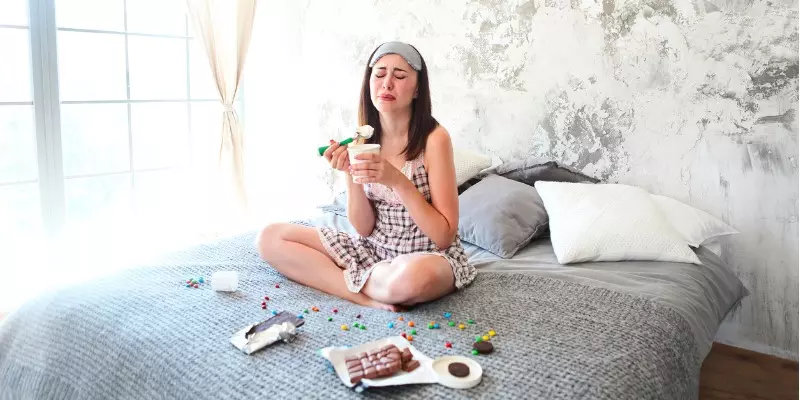
By Zoe Davis, MA, LMHC, MS, CNC
While this is a stressful time for many, it is also an opportunity to practice mindfulness and deep compassion for ourselves and our community. Food choices may be more emotional at this time as people look to food for comfort to lower anxiety and mitigate feelings of a loss of control. I hope some of these ideas for managing stress eating will be helpful to you and will provide their own source of comfort.
1. Try the H.A.L.T. method for emotional eating.
When going to get something to eat, simply check in to gauge what your real need is by asking yourself: “Am I Hungry, Angry, Lonely, Tired?” If you’re hungry, eat some nourishing food. If you’re angry (or stressed or anxious), do something to attend to that emotion, such as journaling, meditation, diaphragmatic breathing, drawing, or coloring (even adults can do this!). If you’re lonely, reach out to a friend or family member, and make regular social engagements a priority (virtually for now). If you’re tired, rest, drink some water, do some mild stretching, or get some fresh air with a walk to replenish your energy. When we create more space between the thought of eating something to soothe our emotions and the actual consumption, we create awareness of our true need and increase the likelihood of doing something to attend to that actual need.
2. Feed yourself well, and regularly.
Low blood sugar exacerbates feelings of stress and anxiety. Make sure you’re consuming regular meals that include adequate protein, healthy fat, plenty of vegetables, and some low-sugar fruit. Don’t go too long between meals, especially if you’re prone to feeling anxious or stressed. Your brain and body need nutrients regularly throughout the day, and when we are missing key B vitamins, fiber, minerals (like magnesium), and probiotics, we can feel more amped up and have a harder time relaxing.
3. Slow down your meals/snacks.
Take a few deep breaths before eating and chew your food thoroughly. Eating this way engages the parasympathetic nervous system and allows for better digestion and greater benefit from the foods you eat. This practice also naturally moderates the amount and types of food your body actually needs, drastically reducing the need for willpower.
4. Keep non-nutritive “comfort” foods out of your home.
Now is a great time to focus on the essentials and avoid foods that fill you up but don’t actually nourish you. Try making warm broth-based soups, roasted root vegetables, baked pear or apple with cinnamon, and gluten-free whole grains or pseudo-grains like wild rice, quinoa, and buckwheat as part of your comfort foods instead of white flour-based foods or sugary desserts.
5. Avoid stimulants.
Stimulants—such as refined sugars, too much caffeine, dyes, additives, and artificial sweeteners—can irritate or over-activate the nervous system and exacerbate anxiety, making it more difficult to experience a sense of calm.
6. Make time with family or friends to enjoy meals together.
If you live with others, take turns cooking and prepare the table where you will eat as a part of the meal to be enjoyed. Light candles, play relaxing music, and have positive conversations as part of the meal. Avoid stressful conversations with meals, and if you live alone, invite friends to a virtual dinner party via computer or phone. You can enjoy each other’s company even when not in the same space.
7. Practice gratitude.
Consider the work that went into growing or raising your food, the incredible abundance of our planet, and the many people along the way from planting to delivery that work hard every day to keep you nourished. Gratitude keeps us focused on appreciation, which is a boost to our immune system and can significantly lower stress levels.
8. Include intentional movement in some form on a daily basis.
When we move, we’re more in touch with our physical body and tend to choose healthier food options and drink more water. Additionally, exercise is immensely beneficial for lowering anxiety, improving our immune resistance, reducing stress, and encouraging sound sleep. While much of our lives may be more confined than we would like, we can still move every day. Some ideas include going for brisk walks/hikes in our neighborhood, taking dance classes online, doing weight resistant exercises with an app, or completing a regimen of yoga poses from books or instructional videos.
9. Tap into your creative self or learn something new.
Try a virtual class online, get out your paintbrushes and paper, do collage, sing, dance, write poetry or stories, learn a language (or re-learn one), play a musical instrument if you have one, sew, knit, or anything else you’d like to try. Creativity is a great way to express yourself and de-stress. When we are creative and feel ourselves expressed, we are using energy in a positive way and tend to feel less restless. Decreasing feelings of restlessness can keep us from eating out of boredom.
10. If you have the capacity and aren’t doing too much already, offer to help someone else.
Volunteer in any way that is safe for you. Volunteer Match has thousands of opportunities, and you can do many of them virtually, or you can come up with your own way to help in your neighborhood. When we feel a sense of contribution and connection with our community, we tend to feel more in control and more grounded. This feeling is empowering and often leads us to take better care of ourselves (with food, movement, sleep, and more), as we feel more important to those around us.
11. Practice good sleep hygiene.
Try to go to bed at the same time each night and limit foods at least 2 hours prior to sleep. Use blue-light filters on computers, phones, or tablets if you need to use them in the hour prior to bedtime. Getting at least 7 hours of sleep regularly helps to regulate hunger hormones, improve energy, and increase our stress tolerance.
About the Author: Zoe Davis, MA, LMHC, MS, CNC, Amen Clinics Northern California
Zoe Davis, MA, LMHC, MS, CNC is a nutrition therapist, integrative health coach, and certified Irlen screener at Amen Clinics, where she has been honored to work with patients over the last four years. Zoe has Master’s degrees in human nutrition and functional medicine, is a licensed mental health counselor, and has a post-graduate certificate in nutritional psychology. This unique combination of education in both nutrition and psychology allows her to use a mind-body approach in a deeply integrated way.
Find out more about Amen Clinics, which offers comprehensive clinical evaluations and remote therapy sessions as well as in-clinic brain scanning, by speaking to a specialist today at 888-288-9834. If all our specialists are busy helping others, you can also schedule a time to talk.





Whilst I appreciate the good intent by Zoe Davis’s 11 tips on how to combat stress & to avoid eating poorly during the pandemic, I feel & know from my own experience that those things are much easier to do when you are feeling well & are not stressed. However, I, like many others, struggle with mental health problems, particularly depression, & when you are in this negative frame of mind, you just cannot follow sensible advice. You know you should, but you just can’t, & that’s what makes depression in particular so very hard to treat or manage. I feel that many health practitioners, including psychiatrists, completely miss this point, & have no real awareness of how difficult the mentally ill’s position is. You have to have personally experienced depression before even beginning to understand it, & too many health advisors dish out their advice, but from only a well person’s point of view. The advice/tips Zoe offers are all great, but to be able to necessarily follow them just isn’t that easy….
Comment by Lyn. B. — April 20, 2020 @ 4:30 AM
Once again, we seek ‘catchy’ little phrase models to avoid what any logical thinking individual should know…My mother emphasized healthy foods at meal time…The use of logical exercise…not needed are expensive health clubs with fancy, reveling body clothing…yoga, i.e., bending your body into abnormal positions. or health (not trained) so called coaches…Plant a garden, trend your yard…walk extensively…I have been doing extensive study of the individuals in the Blue Zones (check our Loma Linda, California)..also, the individuals who, at one time, had idyllic environments & family units…now being ruined by modern society…Do a little research on the individuals in the Abkgasua, Vilicbamba and Hunza societies. They all maintain a strong spiritual foundation….Zero…phycologists, brain picture doctors, miracle medications…As long as we continue to encourage people to act like victims and not take responsibility for their own health…we will continue to be a society of needy individuals.
Stop giving responsibility to child care services to raise your children and ‘senior citizen’ locked-down ‘ gated…senior citizen farms…Embrace your children…raise your children…with a mother & father…then take care of your grandparents…don’t abrogate your responsibility to academicals…
Keep in mind…certified is not qualified…
(good to have the opportunity to comment…I know this will not be posted but perhaps the person reading it will learn something…)
Peace be with you…
Comment by Dr. Henry Sinopoli — April 20, 2020 @ 7:59 AM
Dr. Sinopoli,
Wow! Well said! And thank you. Best words I’ve heard so far during this stay at home.
C. Mc Donald
Comment by Catie McDonald — April 21, 2020 @ 8:03 AM
Wow! Well said. And thank you! Best words I’ve heard thus far during this stay at home.
Comment by Catie McDonald — April 21, 2020 @ 8:06 AM
H.A.L.T. is a pneumonic I learned when I became part of the AA membership. It is amazing how many simple, but powerful, ideas I have learned in the rooms. You have 4 sets of initials after your name which leads me to question the origin of HALT. On my computer search there was an indication that perhaps it originated in the AA rooms? Thanks for your share!
Comment by Diana Peart — April 22, 2020 @ 1:24 PM